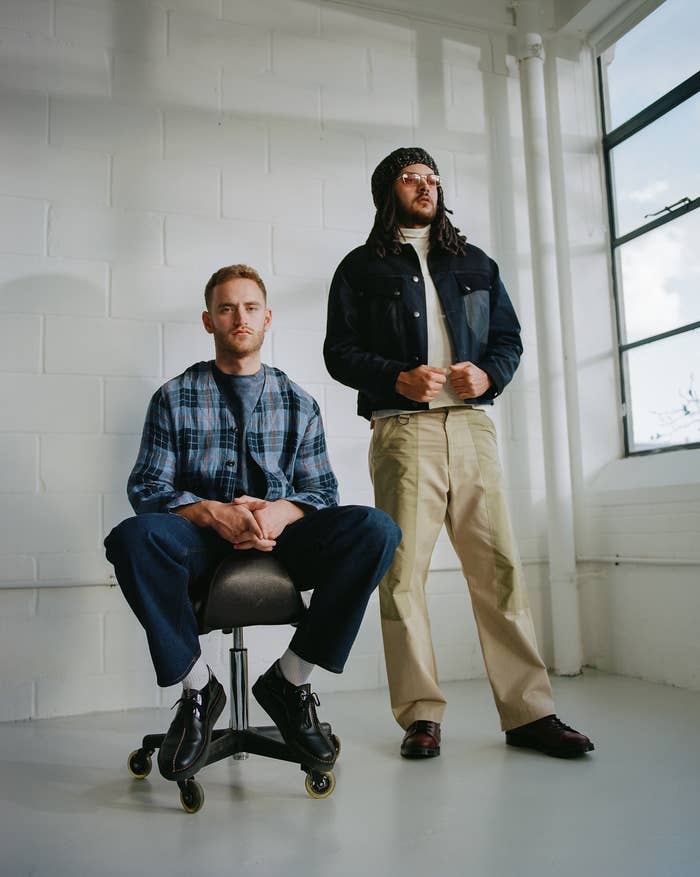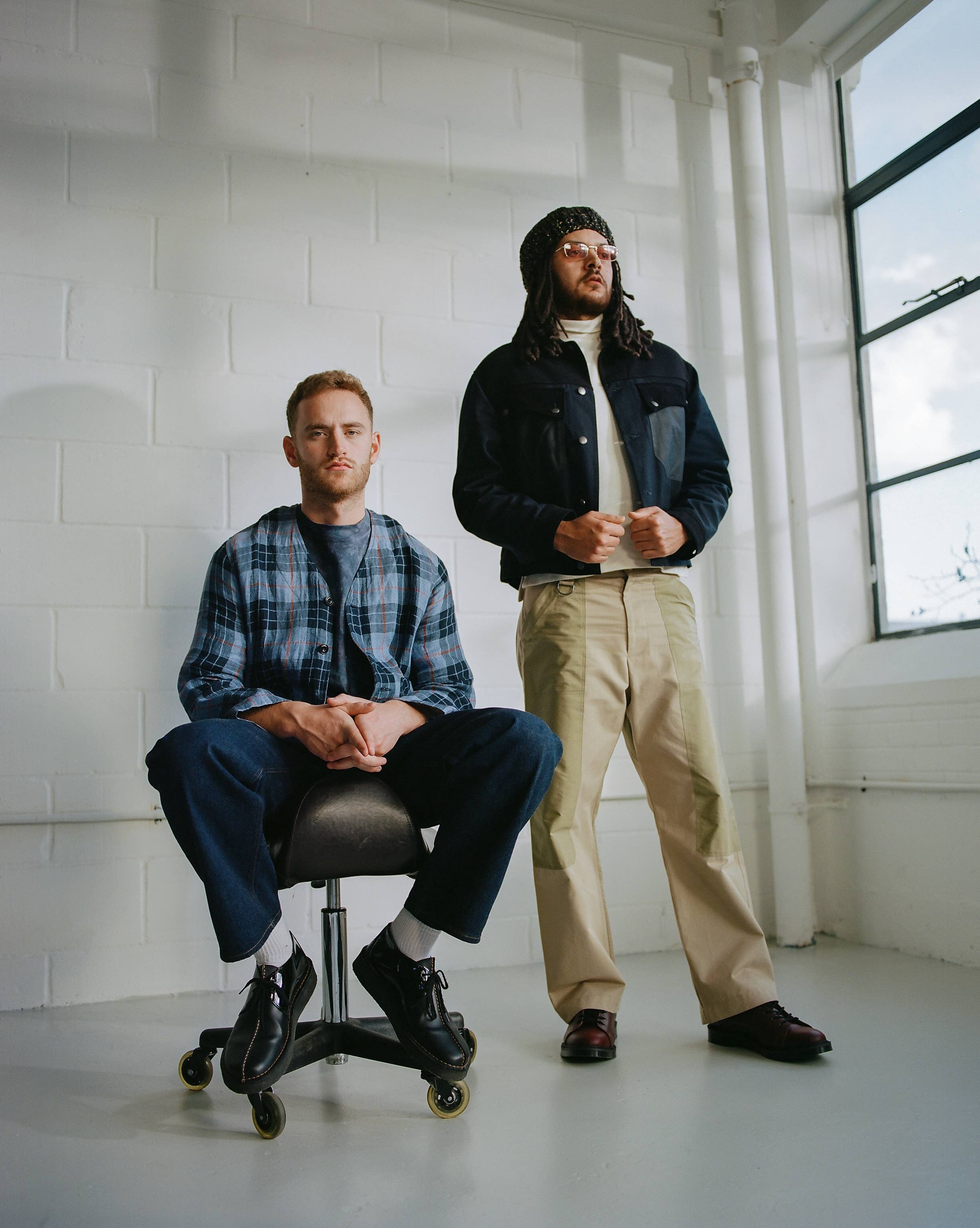
South East London has created yet another masterpiece.
What Kinda Music is the latest collaborative effort from singer/guitarist Tom Misch and drummer Yussef Dayes, the record’s ambiguity and freedom reigning heavy throughout. Taking a very loose interpretation of their respective jazz backgrounds, the two musicians partner on an album that heralds no genre—it is simply just art—and to call this a collision of two worlds wouldn’t be true either because, whilst Dayes and Misch certainly hail from different musical disciplines, the two have been on each other’s radar for quite some time. They both call South East London home—a minor note in today’s globalised music industry—yet, somehow, it plays a part in the narrative of this musically multilingual pairing.
For Tom, this project is an evolution—from the warm embrace of Beat Tape 2, flowering into the summer-encapsulating Geography, and now the more mature What Kinda Music delving into the improvisational, perhaps even darker pockets of Misch’s inner psyche. For Yussef, new ground is similarly broken: an artist who feeds and thrives off improvisation, this creative process is more familiar, yet the drummer is still introduced to a new realm of song-making. For both, this was a chance to experiment and it has definitely paid off.
Collaborating with old friends and new, the emphasis here has been placed on the ‘organic’. The project solely relies on the chemistry between the duo, allowing each track to effortlessly flow into the next. Two years in the making, Tom Misch and Yussef Dayes have produced what could be a pivotal point in both their musical careers in What Kinda Music. We hopped on the phone with them to talk about it.
COMPLEX: The first time you both showed any sign of working together was at Tom’s O2 Brixton Academy show in 2018, but how did this pairing first come about?
Yussef: We were already recording the album before that tour. We were making music while Tom was touring Geography, so it kinda just made sense to do the support ting. At the beginning of that year, we started recording.
Tom: Well, for me, I love drums—who doesn’t?—and Yussef’s the guy to work with when it comes to drums. And yeah, we grew up in the same area—I’ve known about Yussef for a while—but we didn’t really intend on making this album. We just got in the studio and it just happened! We kept on creating stuff, and it felt so organic.
We know the music speaks for itself, but you two have very different sounds. What about each of your sounds do you think complement each other?
Yussef: I think I maybe come from a different background. Even if you come see me live with Rocco & Charlie, 50% of the show is improvisation, so we’re just jamming on the spot. And similar to Yussef Kamaal, that was all just improvised, so I think maybe bringing that side to Tom’s music kinda takes him out of his field. Even just seeing Tom play the guitar, he’s extremely talented, so being able to showcase that side of his music was great.
Did Tom take you out of your comfort zone?
Yussef: 100%, man! I’ve got loads of ideas, but making it into a song, or making the idea from a jam session into a song format and just watching him do that and produce the tracks together, it’s like… Even a couple tracks on the record, I was playing my drums, come into the studio and it’s already into some mad track and I was like, “I didn’t even know you were recording that.” Just the proficiency of knowing how to produce the music is a different level to what, obviously, I’ve been doing. There’s just been different elements that we’ve been taking from each other that have kind of just happened.
Tom: I’ve learned a lot from this record. I think that’s the good thing about collaboration: you pick up a lot of things. How Yussef works, and what he thinks we should do with the tracks as we’re working on stuff, that’s been really nice.
The voice notes on “Julie Mangos”, who’s speaking?
Both: That’s our dads! [Laughs]
So, Tom, it’s your dad that says, “It’s better than Geography”? I wanted to ask you how you feel like your music has evolved since the Geography album?
Tom: I don’t think it’s necessarily better, it’s just part of the evolution. I’m always making a lot of music and I’m putting stuff out all the time, and I think you can see from the start of my career how I’ve evolved as an artist because everything’s gone up online. It’s not better, it’s just a different stage in my life and it’s more mature. I think collaborating with Yussef has brought out something else. It’s more live, and I guess I’m listening to different stuff now. I think I’ve always wanted to make a record like this for a while. Recording live drums is difficult, but with this record it just came together.
Same question to Yussef: where are you now in a different point from Black Focus?
Yussef: So when I recorded Black Focus, my mum passed about two months before, so that record for me, personally, was a direct response to that feeling of grief and what I was going through. Naturally, I’m a type of person that just responds to what’s going on in my life. When I’m recording, I’m just thinking about channelling that energy. Over the last couple of years working with Tom, I’ve been in a completely different headspace and I feel like I’ve come into my own as an artist, whereas before it’s always been like I’ve been in a band with my brothers, the Yussef Kamaal thing. I suppose now, being in my own entity, I can maybe tap into influences that I couldn’t tap into before.
Tom: That’s the thing about collaborating.
Yussef: Yeah, I’m into a lot of jazz, obviously. My dad’s Jamaican, so reggae music too, but at the same time I’m into bands like Talk Talk and Radiohead and just bringing those different elements of what I’m into in this record really takes it into a different direction.
Tom: I think the collaboration does work well because we do have similar influences, but we also have different ones. We agree on certain things, but some things I wouldn’t have done without Yussef. I reckon he’s probably into darker stuff, and that brought out a darker side in me. I do have that in me; people just think that because Geography is so summery, I don’t have that in me. Collaboration brings out different things.
So who were you listening to during the creation of the album? Who were you channelling?
Tom: We were channelling so many different things, and it was very day to day, like what’s happening in the studio right now: Yussef’s playing these drums, that sounds cool, I’m gonna try adding some reverb or some other stuff here. It’s like an experiment. I think we channelled a lot of Radiohead, some ‘80s and ‘70s music, the way they recorded their instruments in that era.
Yussef: Yeah, there were a lot of different influences. Obviously, a lot of hip-hop influences—we’ve got Freddie Gibbs on the “Nightrider” track. We recorded that with a guy called Miles James in his studio, kind of getting that analogue sound. Even Bill Withers was an inspiration. But each track is its own thing—no one track is the same.
Tom: It’s funny: What Kinda Music, the lead track, people were saying it’s got some Massive Attack vibes, and I’ve never even listened to Massive Attack.
“It’s about the music and the craft, the skillset. It’s not about the hype.”—Yussef Dayes
So the creative process for this was to literally go into the studio and decide the day of?
Yussef: Yeah, man. We had a choice of different instruments. We started using OP-1, and a lot of other stuff. We were finding a load of different synth sounds that we were messing around with and recording stuff we had on voice notes. We usually started with a synth and some drums, and went from there.
Tom: As the record evolved, we sort of ended up with a certain palate of sounds. We didn’t intend to make it but it just happened from our experimenting. Like Yussef said, the OP-1 was a big part of the record, and the way it was mixed also makes it sound the way it does.
I know you guys are very familiar with Rocco Palladino and Kaidi Akinnibi, but what was it like to work with Freddie Gibbs? What do you think he brought to the record?
Yussef: He’s a gangster rapper, innit, so just straight away on the track he’s boasy with it. Soon as I heard it, I was like: “Yeah, man, that’s what it needed!” It suited the track straight away so it really came together nicely.
Yussef, what was it like to work with Virgil Abloh?
Yussef: It’s a similar thing to the work with Tom: it’s a collaboration. It’s kinda just organic, too. In this day and age, artists are afraid to be real and just say I enjoy this person’s music. Same with Tom: before we started working, we had an appreciation for each other’s music. Sometimes it doesn’t have to be a collaboration, but when it is, when there’s mutual respect, it makes sense. That’s how I feel with Virgil. I like his creps, I’m always rocking them, and then Benji B got us to play at the Louis Vuitton event, and then from there, we kinda just kept in contact. We then did our thing in Paris with the soundsystem. I was rocking this new pink tracksuit, saw the soundsystem was pink, and we just recorded the ting and people loved that. Since then we’ve just been going back and forth with music, seeing how it can work with what he’s doing, and we’ve been talking about doing some sort of stage design and stuff in the future, so there’s future plans there and I feel like it’s good to have people like Virgil on board.
What does it mean to release with a label as iconic as Blue Note?
Tom: It feels amazing, man. A lot of legendary records have been released on Blue Note. For me, this felt like the record to do it, over one of my solo records, especially because… I’m not saying you’re a jazz drummer, Yussef, but you definitely have that influence, you know? And it may not sound like a jazzy record, but it’s definitely jazzy in the sense that it came from improvising with a sense of freedom and us just seeing what happens. So yeah, it feels amazing.
I know you two are openly reverent of your idols, but how does it feel knowing that you’re becoming the proprietors of your own respective scenes?
Tom: From my point of view, I see a lot of guitarists playing my stuff, and I love that side of things. I love people nerding out on my stuff, because I nerded out, do you know what I mean? So to see the younger kids playing it all is amazing. It’s about the music and the craft, the skillset. It’s not about the hype. It’s about the music, which is what it’s all about at the end of the day.
Yussef: Even though you see people like John Coltrane on Blue Note—and for me, they’re like the OGs, so I always see them up there—I’ll still put on Herbie Hancock and The Headhunters and feel like I’ve got to take this to another level. To move forward, you have to check what was before. That’s why I need to keep playing. I’ve got my pads here and it’s been blessed, but I’m always thinking that I need to elevate. Now that we’re working with Blue Note and the mad artists they’ve released that have pushed the game, I just need to make sure that we are keeping the craft there.
Who would you say you listen to for a jazz ‘education’?
Yussef: Obviously, Herbie Hancock, Miles Davis, John Coltrane, Nina Simone, Billy Cobham, Tony Williams, Idris Mohammed... I go through different phases, whatever I’m feeling, but definitely a lot of the seventies stuff where it started to get more electric, like John McLaughlin and the Mahavishnu Orchestra. As I get older, I’m just finding more music. There’s so much out there that I’m just finding out about and that’s an amazing feeling. I’m not setting boundaries for myself. You have these people that know every single record, but sometimes that’s not a good thing—not knowing everything gives you somewhere to go to and to find out about. It also allows you to build your own voice.
Why the track title “Kyiv”?
Tom: So we were working with this director from Brazil, Douglas Bernardt, and he came up with this concept for a video and said the Ukraine is the place to do it. He visualised everything, and the architecture in Kyiv is quite cool—the buildings look pretty funky and stuff—so he came up with the idea. We shot “What Kinda Music” and “Lift Off” in Kyiv, and we had a bit of film left on the reel so we started recording and “Kyiv” happened. Rocco just started playing these chords and the rest of the jam just happened and we captured it.
Where does this record sit in your catalogue?
Tom: For me, it’s quite a pivotal album because it’s more different than anything I’ve done before. Beat Tape 2 to Geography are closer than Geography to What Kinda Music. It’s a stepping stone for me to do new, different stuff with my next record, so people won’t be too shocked. We’ve put out this album, some people won’t like it, but the fans who like that feel-good, summery vibe will. But I think I’ll get some new fans, too, so it’s definitely a stepping stone.
Yussef: I feel like, as mad is it to say, it is what it is. It’s a piece of art—you either like it or you don’t. I think you can’t really worry too much; some people are gonna be overcritical, some people are gonna love it. It’s just nice to shoot those kinda videos and have the ability to do these things that I’ve always wanted to do. It’s just making art. It’s what art should be. You don’t know what’s going to happen, you don’t know where it’s going to go, but just the fact that you’re creating I feel like that, in itself, is the beauty of it. For me, it’s the first time properly working with vocals too—a lot of my music is usually instrumental. Obviously, some records on the track are instrumental and some are Tom singing, so it’s been nice to have that side of things.
I know it’s like choosing your favourite kid, but what’s your favourite cut from the record?
Tom: I think I love “Tidal Wave”. It’s just a sexy slow-jam vibe. I’m really happy with the lyrics and the sonics on that. I love them all, though. They’re all so different.
Yussef: Ahhh, man! I go through phases, but I literally just put “Nightrider” on. For me, that’s the finesse. We’ve got the vocals, Freddie came hard on it too. Just everything about it!
Tom: Everything came together on that.
Yussef: That’s definitely a proud moment, that one. But then “The Real”—the sample, the way Tom processed the drums... “Tidal Wave” is a banger, too. All of them, man [laughs].
The way you guys have been talking about the album makes is redundant to talk about part two then, right? It’s just organic; it’ll happen if it happens.
Tom: That’s it.
Yussef: Exactly. Even if it’s for Tom’s stuff or my stuff, we’re always gonna be working together. We’ve built this great working relationship, so who knows what the future holds.

